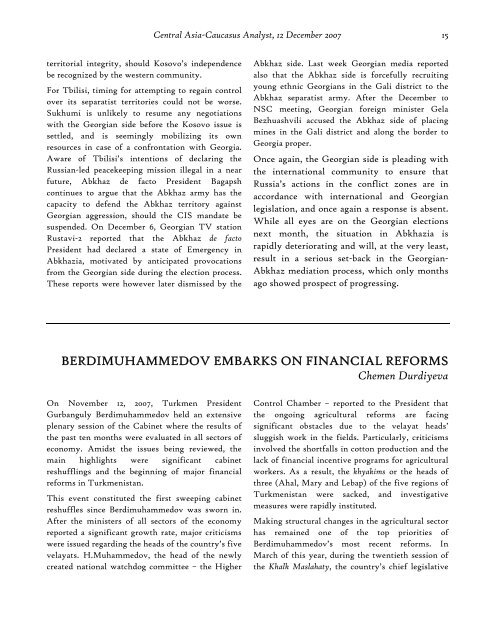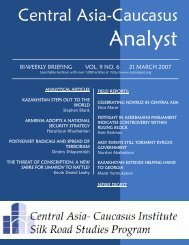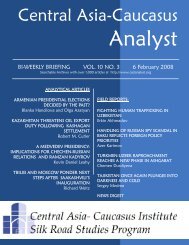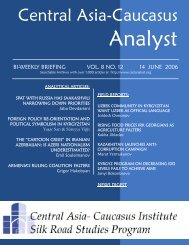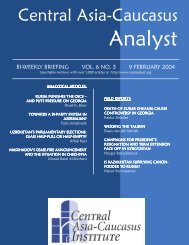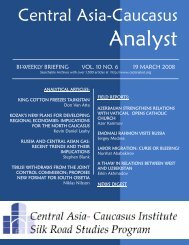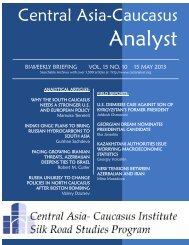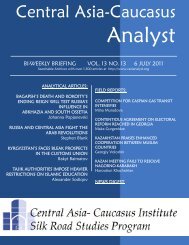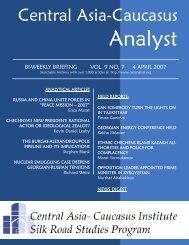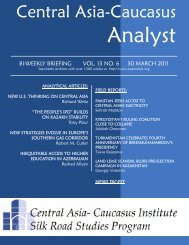Johanna Popjanevski - The Central Asia-Caucasus Analyst
Johanna Popjanevski - The Central Asia-Caucasus Analyst
Johanna Popjanevski - The Central Asia-Caucasus Analyst
Create successful ePaper yourself
Turn your PDF publications into a flip-book with our unique Google optimized e-Paper software.
<strong>Central</strong> <strong>Asia</strong>-<strong>Caucasus</strong> <strong>Analyst</strong>, 12 December 2007 15territorial integrity, should Kosovo’s independencebe recognized by the western community.For Tbilisi, timing for attempting to regain controlover its separatist territories could not be worse.Sukhumi is unlikely to resume any negotiationswith the Georgian side before the Kosovo issue issettled, and is seemingly mobilizing its ownresources in case of a confrontation with Georgia.Aware of Tbilisi’s intentions of declaring theRussian-led peacekeeping mission illegal in a nearfuture, Abkhaz de facto President Bagapshcontinues to argue that the Abkhaz army has thecapacity to defend the Abkhaz territory againstGeorgian aggression, should the CIS mandate besuspended. On December 6, Georgian TV stationRustavi-2 reported that the Abkhaz de factoPresident had declared a state of Emergency inAbkhazia, motivated by anticipated provocationsfrom the Georgian side during the election process.<strong>The</strong>se reports were however later dismissed by theAbkhaz side. Last week Georgian media reportedalso that the Abkhaz side is forcefully recruitingyoung ethnic Georgians in the Gali district to theAbkhaz separatist army. After the December 10NSC meeting, Georgian foreign minister GelaBezhuashvili accused the Abkhaz side of placingmines in the Gali district and along the border toGeorgia proper.Once again, the Georgian side is pleading withthe international community to ensure thatRussia’s actions in the conflict zones are inaccordance with international and Georgianlegislation, and once again a response is absent.While all eyes are on the Georgian electionsnext month, the situation in Abkhazia israpidly deteriorating and will, at the very least,result in a serious set-back in the Georgian-Abkhaz mediation process, which only monthsago showed prospect of progressing.BERDIMUHAMMEDOV EMBARKS ON FINANCIAL REFORMSChemen DurdiyevaOn November 12, 2007, Turkmen PresidentGurbanguly Berdimuhammedov held an extensiveplenary session of the Cabinet where the results ofthe past ten months were evaluated in all sectors ofeconomy. Amidst the issues being reviewed, themain highlights were significant cabinetreshufflings and the beginning of major financialreforms in Turkmenistan.This event constituted the first sweeping cabinetreshuffles since Berdimuhammedov was sworn in.After the ministers of all sectors of the economyreported a significant growth rate, major criticismswere issued regarding the heads of the country’s fivevelayats. H.Muhammedov, the head of the newlycreated national watchdog committee – the HigherControl Chamber – reported to the President thatthe ongoing agricultural reforms are facingsignificant obstacles due to the velayat heads’sluggish work in the fields. Particularly, criticismsinvolved the shortfalls in cotton production and thelack of financial incentive programs for agriculturalworkers. As a result, the khyakims or the heads ofthree (Ahal, Mary and Lebap) of the five regions ofTurkmenistan were sacked, and investigativemeasures were rapidly instituted.Making structural changes in the agricultural sectorhas remained one of the top priorities ofBerdimuhammedov’s most recent reforms. InMarch of this year, during the twentieth session ofthe Khalk Maslahaty, the country’s chief legislative


